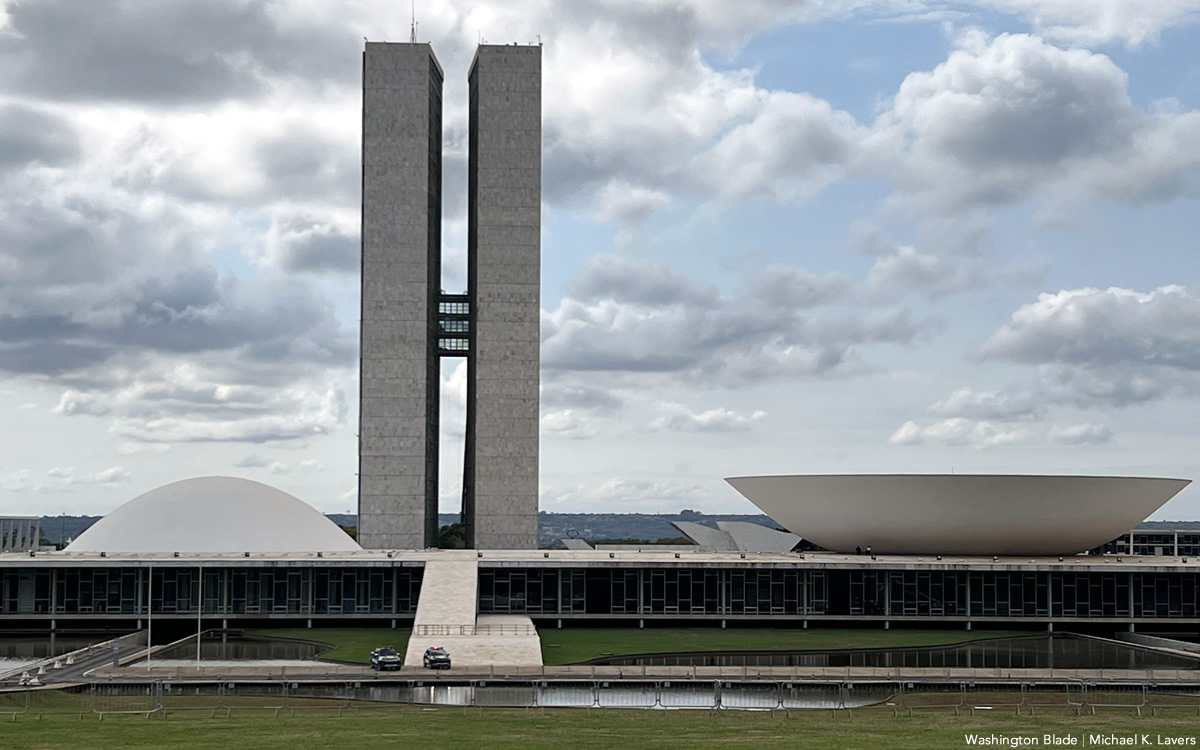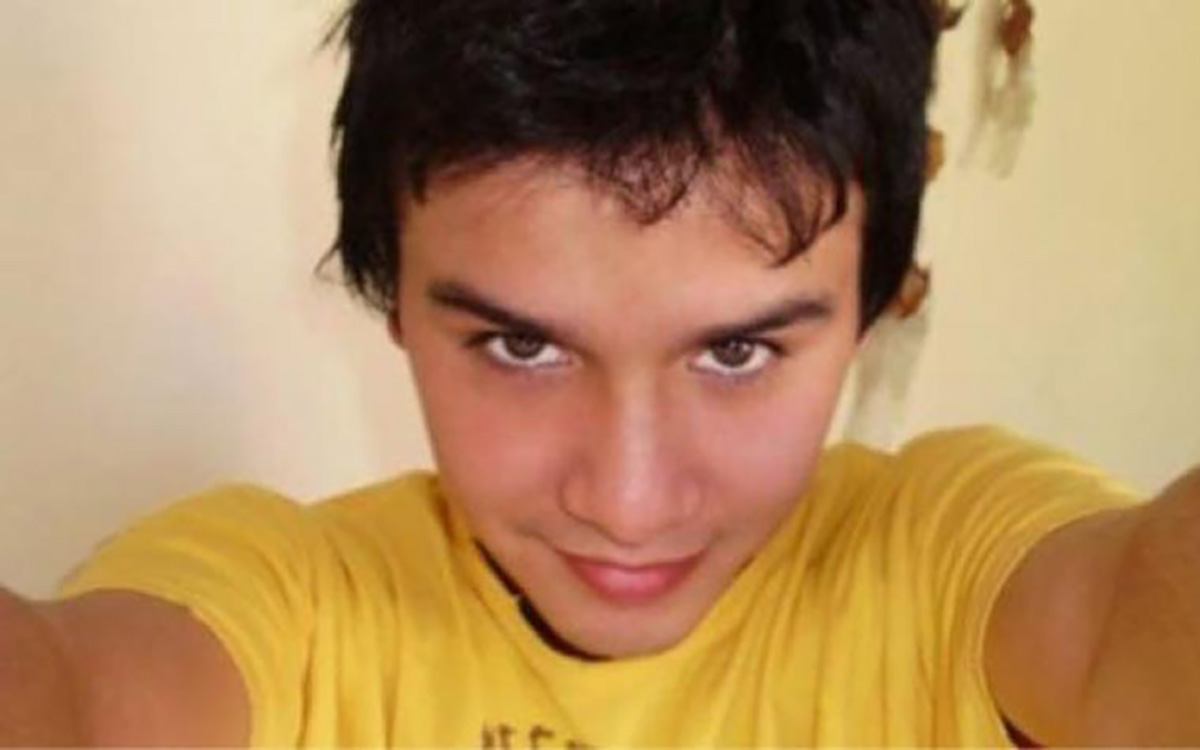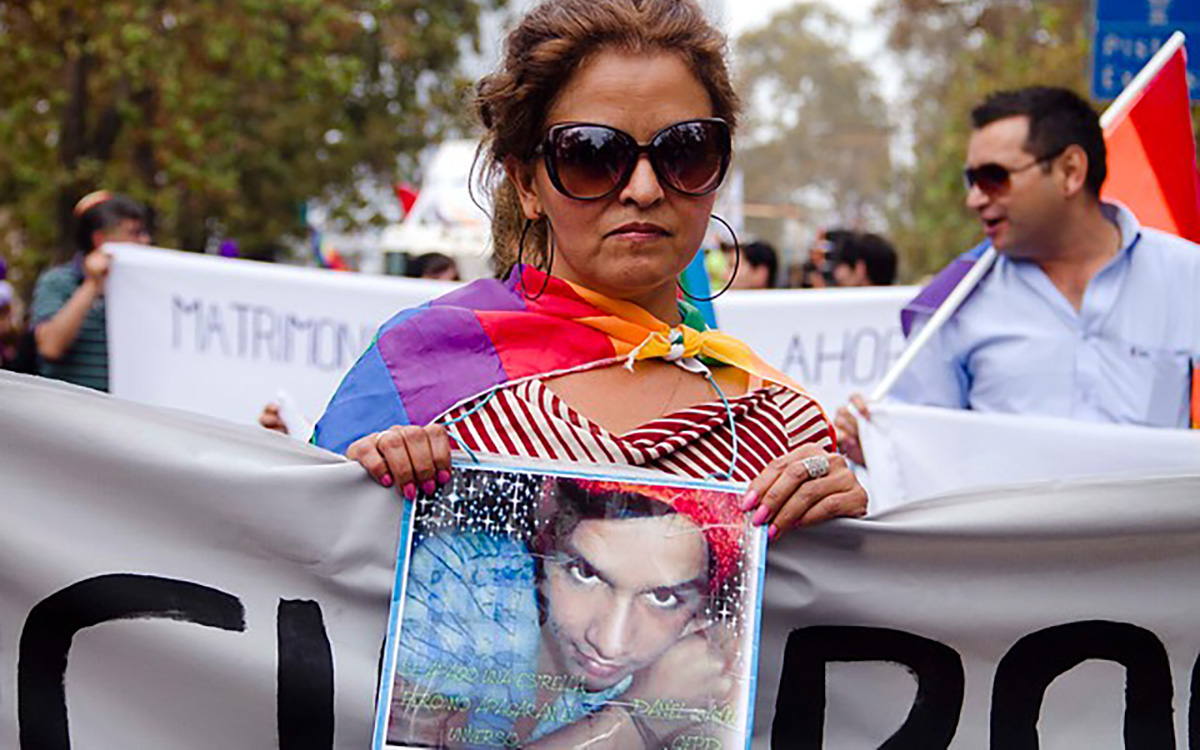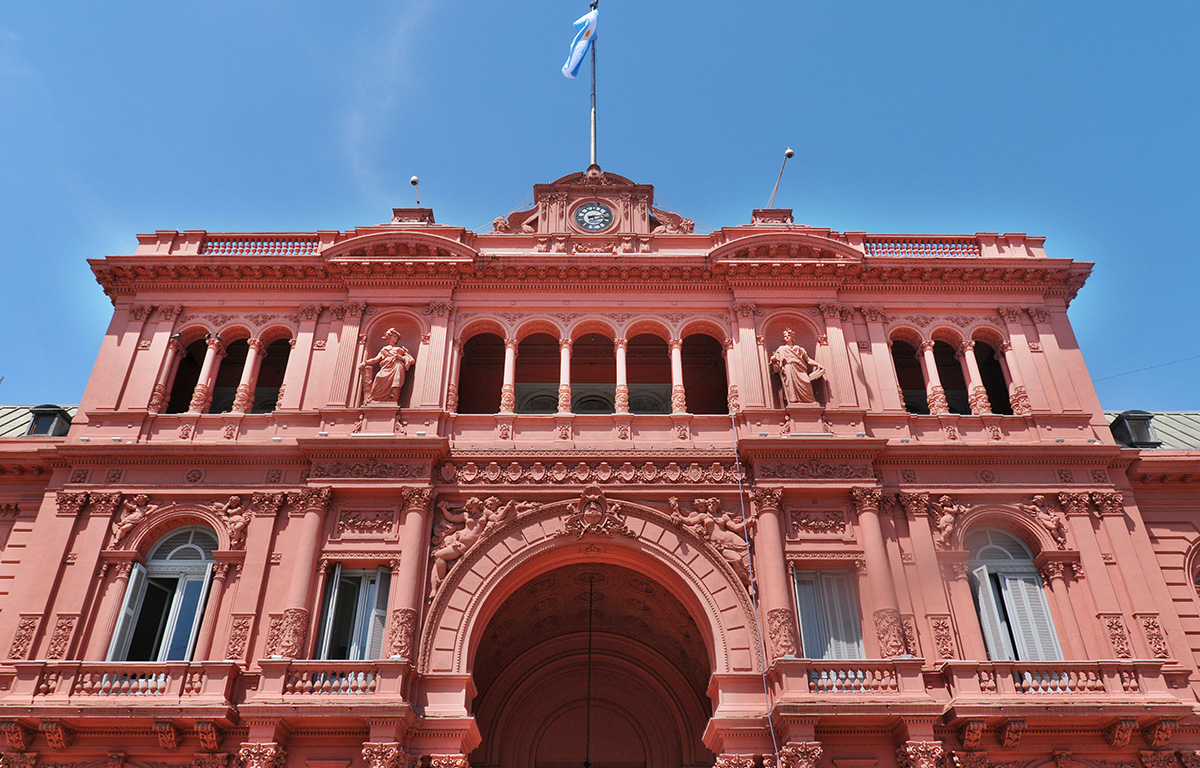South America
Bolsonaro supporters storm Brazilian Congress, Supreme Court and presidential palace
LGBTQ and intersex advocacy groups condemn ‘coup’

Thousands of supporters of former Brazilian President Jair Bolsonaro on Sunday stormed the country’s Congress, presidential palace and Supreme Court.
Videos from Brasília, the Brazilian capital, show Bolsonaro supporters, many of whom were wearing yellow and green Brazilian soccer jerseys, entered the three buildings and ransacked them after overwhelming police officers.
Media reports indicate it took several hours for authorities to regain control of Three Powers Square in which Congress, the presidential palace and the Supreme Court are located. CNN Brasil notes at least 400 people have been arrested, and Supreme Court Justice Alexandre de Moraes has removed Federal District Gov. Ibaneis Rocha from his post. Additional reports also indicate several journalists were injured during what has been described as a “coup” and “terrorist acts” that took place two days after the U.S. commemorated the second anniversary of Jan. 6.
President Luiz Inácio Lula da Silva took office in Brasília on Jan. 1.
Da Silva, a member of the leftist Worker’s Party, was Brazil’s president from 2003-2010. He defeated Bolsonaro, a member of the right-wing Liberal Party who represented Rio de Janeiro in the Congress for nearly three decades before he became president in 2018, in the second round of the country’s presidential election that took place on Oct. 30, 2022.
Bolsonaro ahead of the election sought to discredit Brazil’s electoral system.
“The Brazilian presidential election has fueled a misinformation emergency that has tipped the LGBT+ community into a boiling pot of fake news,” wrote Egerton Neto, a Brazilian LGBTQ and intersex activist who is also an Aspen New Voices Fellow and manager of Oxford University’s XX, in an op-ed the Washington Blade published on Oct. 28, 2022, two days before Da Silva defeated Bolsonaro. “This is part of a broader global problem and we need a global plan to stop it.”
Bolsonaro, who has yet to publicly acknowledge he lost the election, flew to Florida on Dec. 30, two days before Da Silva’s inauguration.
Da Silva, who was visiting the flood-ravaged city of Araraquara in São Paulo state on Sunday, described those who stormed Congress, the presidential palace and the Supreme Court as “fascist fanatics” and ordered the federal government to take control of security in the Federal District in which Brasília is located. Da Silva in his nationally televised comments also accused Bolsonaro of inciting his supporters after the election.
Brazilian federal prosecutors have asked the Supreme Court to issue an arrest warrant for now former Federal District Security Secretary Anderson Torres, who was Brazil’s Justice and Public Security Minister from March 2021 until Bolsonaro’s term ended, and “other public agents responsible for acts and omissions.”
Bolsonaro in a series of tweets condemned Sunday’s events.
“Peaceful demonstrations, in a legal way, are part of democracy,” he tweeted. “However, depredations and invasions of public buildings as occurred today, as well as those carried out by the left in 2013 and 2017, go against the rule.”
“Throughout my mandate; I have always been within the four lines of the Constitution: Respecting and defending the laws, democracy, transparency and our sacred freedom,” added Bolsonaro. “I also repudiate the accusations, without evidence, attributed to me by the current head of the Executive (Branch) of Brazil.”
– Manifestações pacíficas, na forma da lei, fazem parte da democracia. Contudo, depredações e invasões de prédios públicos como ocorridos no dia de hoje, assim como os praticados pela esquerda em 2013 e 2017, fogem à regra.
— Jair M. Bolsonaro 2️⃣2️⃣ (@jairbolsonaro) January 9, 2023
– No mais, repudio as acusações, sem provas, a mim atribuídas por parte do atual chefe do executivo do Brasil.
— Jair M. Bolsonaro 2️⃣2️⃣ (@jairbolsonaro) January 9, 2023
President Joe Biden, U.N. Secretary-General António Guterres, Organization of American States Secretary-General Luis Almagro, EU foreign policy chief Josep Borrell, Cuban President Miguel Díaz-Canel and Chilean President Gabriel Boric are among the world leaders who condemned Sunday’s assault. LGBTQ and intersex rights groups in Brazil echoed these condemnations.
“We express our most vehement disgust at this attempt and call on the competent authorities to enforce the law for all those criminals who attacked democracy on Jan. 8, 2023,” said Associaçao Nacional de Travestis e Transexuais (National Association of Travestis and Transsexuals), a Brazilian transgender rights group known by the acronym ANTRA, in a statement. “We cannot tolerate any type of attack and especially in this dimension. May the arm of the law also reach (the funders), creators and those who put it into practice. We remain on the right side of history, the side of democracy.”
Toni Reis, president of Aliança Nacional LGBTI+, a Brazilian LGBTQ and intersex advocacy group, in a WhatsApp message to the Blade described the assault as “horrible.” Erika Hilton, one of two trans women elected to Congress last October, described those who carried out the assault as “terrorists.”
“Terrorists invade the Supreme Court and destroy everything,” she said in a tweet that included a video of Bolsonaro supporters inside the Supreme Court. “They also invaded the Planalto (Presidential) Palace and Congress. The involvement of the Federal District’s government in the destruction of Brazil’s capital is evident. Everyone has to be punished.”
South America
Daniel Zamudio murderer’s parole request denied
Raúl López Fuentes convicted of murdering gay man in Chilean capital in 2012

Chile’s Parole Commission on Tuesday rejected a request to allow one of the four men convicted of murdering Daniel Zamudio in 2012 to serve the remainder of his sentence outside of prison.
Raúl López Fuentes earlier this month asked the commission to release him on parole. Zamudio’s family and members of the Movement for Homosexual Integration and Liberation, a Chilean LGBTQ rights group, had gone to court to block the request.
Among the arguments put forward that influenced the commission’s decision is what Movilh categorized as his “high risk of recidivism, linked to the adherence of an antisocial behavior with a tendency to minimize his acts transgressing social norms.”
The commission pointed out that López has psychopathic traits because he is aware of the damage he did to Zamudio and his family.
“In addition, he maintains a high risk of violence, not being advisable to grant the benefit,” the report said.
Zamudio was a young Chilean man who became a symbol of the fight against homophobic violence in his country and around the world after López and three other young men with alleged ties to a neo-Nazi group beat him for several hours in Santiago’s San Borja Park on March 2, 2012. Zamudio succumbed to his injuries a few weeks later.
The attack sparked widespread outage in Chile and prompted a debate over homophobia in the country that highlighted the absence of an anti-discrimination law. Lawmakers in the months after Zamudio’s murder passed a law that bears Zamudio’s name.
López in 2013 received a 15-year prison sentence after he was convicted of killing Zamudio. Patricio Ahumada received a life sentence, while Alejandro Angulo Tapia is serving 15 years in prison. Fabían Mora Mora received a 7-year prison sentence.
Zamudio’s mother, Jacqueline Vera, exclusively told the Washington Blade after the commission rejected López’s request that “we as a family are calmer.”
“Even with my husband we were in a lot of pain at the beginning. It was like a blow of very strong emotions, so we tried to stay calm because we still had to solve the problem,” Vera said. “We had four days to solve it.”
López will have to serve the remaining three years of his sentence before his release.
“I will continue working to improve the Zamudio Law and so that this murderer does not leave prison because he is a danger to society, he does not represent repentance and people like this cannot be free,” she said. “For the same reason, we have to work so that hate crimes have life imprisonment and that is what we will concentrate on.”
South America
Man convicted of killing Daniel Zamudio in Chile seeks parole
Raúl López Fuentes in 2013 sentenced to 15 years in prison

One of the four men convicted of murdering a young gay man in the Chilean capital in 2012 is seeking parole.
Raúl López Fuentes in 2013 received a 15-year prison sentence after he was convicted of killing Daniel Zamudio.
Zamudio was a young Chilean man who became a symbol of the fight against homophobic violence in his country and around the world after López and three other young men with alleged ties to a neo-Nazi group beat him for several hours in Santiago’s San Borja Park on March 2, 2012. Zamudio succumbed to his injuries a few weeks later.
The attack sparked widespread outage in Chile and prompted a debate over homophobia in the country that highlighted the absence of an anti-discrimination law. Lawmakers in the months after Zamudio’s murder passed a law that bears Zamudio’s name.
Patricio Ahumada received a life sentence, while López and Alejandro Angulo Tapia are serving 15 years in prison. Fabían Mora Mora received a 7-year prison sentence.
López has asked the Seventh Santiago Guarantee Court to serve the last three years of his sentence on parole. Zamudio’s family and Jaime Silva, their lawyer who works with the Movement for Homosexual Integration and Liberation, oppose the request.
Movilh represented Zamudio’s family after his murder.
Zamudio’s mother, Jacqueline Vera, during an exclusive interview with the Washington Blade said López’s petition “provoked all the anguish, all the commotion of his time.”
“It was very cruel because in fact two days before we were at Daniel’s grave, where it was 12 years since his death and the beating,” said Vera. “He really does not deserve it.”
“We have gone through very difficult moments,” she added.
The mother, who later created a foundation to eradicate discrimination in Chile, was emphatic in indicating that she and her family “do not accept the release of this guy because he is a danger to society and a danger to ourselves.”
“At the last hearing where they were sentenced, they told us that we are going to remember them when they get out,” said Vera. “They threatened us with death. There is a video circulating on social networks where they were in front of me and they laughed and made fun of me. They told me that I remembered that I had three more children.”

Regarding the possibility that the Chilean justice system will allow López to serve the remaining three years of his sentence on parole, Vera said “with the benefits here in Chile, which is like a revolving door where murderers come and go, it can happen.”
“In any case, I don’t pretend, I don’t accept and I don’t want (López) to get out, I don’t want (López) to get out there,” she said. “We are fighting for him not to get out there because I don’t want him to get out there. And for me it is not like that, they have to serve the sentence as it stands.”
LGBTQ Chileans have secured additional rights since the Zamudio Law took effect. These include marriage equality and protections for transgender people. Advocacy groups, however, maintain lawmakers should improve the Zamudio Law.
“We are advocating for it to be a firmer law, with more strength and more condemnation,” said Vera.
When asked by the Washington Blade about what she would like to see improved, she indicated “the law should be for all these criminals with life imprisonment.”
South America
Argentine president announces state institutions can no longer use inclusive language
Activists condemn Javier Milei’s anti-LGBTQ policies

In a move that has generated concern and criticism throughout the country, Argentine President Javier Milei has announced government institutions can no longer use inclusive language and gender-specific references in their public policies.
This decision comes on top of other controversial measures, such as the closure of the Women, Gender and Diversity Ministry, and an announcement to shutter the country’s National Institute against Discrimination, Xenophobia and Racism.
Former Diversity Undersecretary Alba Rueda, a transgender woman who was the country’s special envoy for LGBTQ issues under former President Alberto Fernández’s government, and gay Congressman Esteban Paulón, in exclusive interviews with the Washington Blade discussed the impact of Milei’s announcement and the impact it will have on Argentine society in terms of human rights and protections for queer people.
“The State had been using the gender perspective and inclusive language to make visible the presence of women in key roles and to recognize nonbinary identities,” Rueda said. “This measure not only erases those advances, but also excludes people who are already recognized by the State in their nonbinary gender identities.”
Rueda noted Congress more than a decade ago “passed the gender identity law, which states in its first article that the State will respect the gender identity of all persons. After changes were made in the structure of the State to be able to generate identity documents, a series of court rulings that recognize nonbinary people in their nonbinary identity arose in 2016, and this (and) that remained unresolved during the Macrista government without recognizing the identity of nonbinary people.”
She pointed out Fernández’s government in 2021 issued Decree 746, which recognized “people with nonbinary identities, gender fluid and those who avoid naming their gender before the State.”
“The State already recognizes this citizenship and here comes that the prohibition of inclusive language excludes in the way of naming people who are already recognized by the State and that effectively the recognition of their gender identity is the condition of not being binary,” said Rueda. “So, the decree is in force, the law is in force, there are nonbinary people with their documents, but who today are not being named in all state documents.”
Paulón said the prohibition of inclusive language is a gesture of violence towards LGBTQ communities.
“Inclusive language has given entity and identity to an important part of the Argentine population,” he said. “This measure represents an act of harassment and violence towards those who identify with inclusive language, including the queer and LGBTQ+ collective.”
“Language is a social and cultural construction, and in Argentina today inclusive language represents and has given entity and identity to an important segment of the population and to a series of social collectives,” added Paulón. “Therefore, something that is not created by decree can hardly be eliminated by decree.”
The congressman told the Blade that Milei’s government announcement was “something that was clearly going to happen.”
“I don’t see the government campaigning in inclusive language or celebrating diversity,” said Paulón.
Milei’s decision has generated intense debate in Argentina, with critics arguing these measures represent a step backwards in the protection of human rights and an attack on diversity and inclusion. Milei’s supporters, on the other hand, defend these measures as part of an effort to promote conservative policies and reinforce national identity.
“It is very serious because it limits the exercise of citizenship and affects the nonbinary population, women and the trans population that is not recognized within the gender binarism,” said Rueda.
She noted Milei during his presidential campaign raised these issues, and has decided to implement policies that harm women and LGBTQ people.
“This is the gravity that is lived today in Argentina, that the Argentine head of state puts in confrontation and reduction of rights to women and LGBTIQ+ people,” Rueda added.
This ban on inclusive language and gender-specific policies has been announced against the context of increased political and social polarization in Argentina. With inflation at alarming levels and an economy in crisis, Milei’s government has sought to consolidate its base by adopting controversial measures that have generated division and unrest in Argentine society.
“That is the institutional and democratic gravity today in Argentina, that the head of state attacks and creates internal enemies and that position is accompanied by the media, amplifying a negative message about our communities,” Rueda said. “Of course that translates into social networks, but it also translates into the attacks that we LGBTIQ+ people experience in the public sphere.”
-

 South America4 days ago
South America4 days agoDaniel Zamudio murderer’s parole request denied
-

 Maryland5 days ago
Maryland5 days agoMontgomery County police chief discusses arrest of trans student charged with planned school shooting
-

 Commentary5 days ago
Commentary5 days agoWorld ‘isn’t much different today’
-

 State Department19 hours ago
State Department19 hours agoState Department releases annual human rights report











